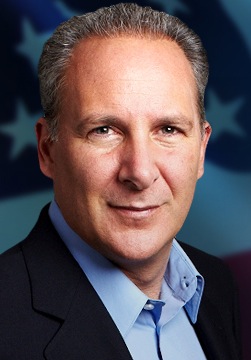Greenspan's Real Conundrum, Stagflation
Today's release of March's much weaker than expected non-farm payroll numbers (110,000 verses average estimates of 213,000), together with February's downward revisions, provides clear evidence that the "recovery" is indeed faltering. Traders sold dollars and bought stocks and Treasuries, on the theory that weaker jobs growth might slow the pace of future rate hikes. However, an hour and a half later, traders bought the dollar back, and dumped stocks and Treasuries, when the Institute of Supply Management released that its February prices paid index surged from 65.5 to 73, causing them to reassess their assumptions.
The conundrum: With job growth faltering, could the economy be headed for the dreaded double dip? However, with the dollar still on the defensive, oil and other commodity prices on the rise (oil prices surged today near $57 per barrel,) employment cost pressures mounting, and foreign producers beginning to pass on higher production and transportation costs to American consumers, inflationary pressures are clearly intensifying. Recession or inflation, which dragon is Sir Prints-a-lot prepared to slay? My guess is neither. Once traders comprehend this dismal reality, they will sell dollars, Treasuries, and stocks, feeding both beasts simultaneously.
An asset driven bubble-economy that lives on credit, dies by it as well. As Greenspan slowly removes the punch bowl, the long intoxicated party guests, as they finally emerge from their drunken stupors, will be confronted with the sobering reality of dealing with the consequences of their inebriation. As interest rates rise, borrowers will realize that they have paid way too much for houses and other assets, and committed to interest payments they cannot afford to make and principals they will never be able to repay. Lenders will also realize they have recklessly lent money to non-creditworthy borrowers, based on insufficient collateral and pie-in-the-sky assumptions. As credit contracts and asset prices fall, so too will consumer spending, and the consumption based economy it supports.
To fight off the recession dragon, Greenspan will look to brandish his only weapon, his interest-rate-cutting sword. However, the minute he does, he will be attacked by his other nemesis, the now much fiercer inflation dragon. To fight this monster, Greenspan will reach for his other weapon, his interest-rate-hiking sword. Realizing that he cannot wield both swords simultaneously, he will slay neither, and be consumed by both.
Below is a commentary that I wrote last June, highlighting the growing threat of stagflation, the evidence for which is now that much clearer.
*************************************
June 24, 2004
Recent Government Numbers Continue Pointing to Stagflation
Recent evidence of higher than "expected" inflation and weaker than "expected" economic growth continues to support the likelihood of a "stagflation" scenario. For those unacquainted with US history prior to MTV, "stagflation," an economic condition most associated with 1970's, involves a period of stagnant growth and high inflation. If the latest economic trends continue, it may be time for all of us to dust off those polyester shirts and 8-track tape players.
Last week the government released higher than "expected" increases in both consumer and producer prices, and larger than "expected" increases in the trade and current account deficits. This week, the government released an unexpected 1.6% decline in May durable goods orders (the forecast had been for a 1.5% gain, and follows an even larger 2.6% decline in April), a larger than expected increase in unemployment claims, and an "unexpected" sharp downward revision to first quarter GDP growth (from a previously reported 4.4% to 3.9%). The GDP deflator was also "unexpectedly" revised upward to show a gain of 2.9% verses the 2.5% gain previously reported. The personal consumption expenditure index was also upwardly revised to 3.2% from the previously reported 3.0%. If these numbers accurately reflected the true rate of inflation, the first quarter GDP gains would have been anemic, even non-existent.
The fact that growth continues to decline, despite the lack of any Fed rate hikes and the continued expansion of the housing bubble (May's home sales surged to a new record high), should be extremely troubling. So, too, should the fact that interest rates during the quarter were also artificially suppressed by record purchases of U.S. treasuries by foreign central banks, with the latter buying 150% of the former's net quarterly issuance. Also disturbing should be the fact that first quarter growth was supported by the one time benefits of higher income tax refunds, and surging home equity extractions. If growth is decelerating now, considering all of the aforementioned temporary props, imagine what will happen when these props are removed.
Inflation, as measured by the CPI, is also likely to continue to increase, as the Fed's "measured" rate hikes will certainly proceed at a rate slower than the rate at which inflation is likely to increase. With the Fed remaining behind the inflation curve, real interest rates will continue to fall even as nominal rates rise. This fact, and the continued expansion of the trade deficit, will exert increasing downward pressure on the U.S. dollar, which has recently resumed its decline against all the major currencies, this week falling to a 10-week low against the Japanese yen. The price of gold has also reversed its short-term decline, rising over $16 dollars per ounce during the last two weeks, closing above $400 for the first time in ten weeks.
Government numbers, flawed as they are, and recent market action in gold and the dollar, all point to the same conclusion: stagflation, U.S. equity and bond investors.
2 March 2005
Peter Schiff
C.E.O. and Chief Global Strategist
Euro Pacific Capital, Inc.



















